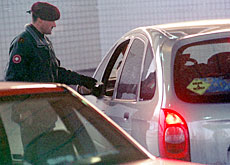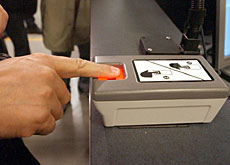Europol accord sparks data protection fears

The Swiss government is hailing this Friday’s signing of a cooperation agreement with Europol as an important step forward in the fight against organised crime.
But concerns have been raised in Switzerland over the effectiveness of the body and its ability to ensure data protection.
Under its European Union mandate, Europol assists member states in preventing and fighting serious crimes including human trafficking, drug trafficking, terrorism and money laundering.
Its tasks are to facilitate the exchange of information between countries, to perform operational and strategic analyses, and to provide expertise and technical support for investigations.
The Europol Computer System, based in The Hague in the Netherlands, is vast.
A centralised information system stores data on persons already convicted of a crime or thought likely to commit crimes in the future, while a second system processes data.
There is a third system for exchanging Europol information with police forces in non-EU countries, such as Canada, Switzerland and Turkey.
According to Jean-Philippe Walter, the federal officer responsible for data protection, the Europol Convention covers provisions regulating the processing of information and data protection.
“Europol is regulated by a convention which contains a whole series of measures to ensure data protection,” he told swissinfo.
“Having myself had the opportunity to meet top Europol officials, I can state that the data protection requirements often go beyond those enshrined in Swiss law.”
Not convinced
But Heinrich Busch, a political scientist and expert on policing issues, is far from convinced.
“I have no doubt about it: where data protection is concerned, Europol is a real danger,” he told swissinfo.
“Europol’s record-keeping capacity is impressive, but in my opinion it openly contradicts the principle of people’s fundamental right to privacy,” he added.
“And faced with this information factory, the citizen is virtually defenceless. On paper, for instance, Europol guarantees a right of consultation, but in reality this is an impossibility.”
A person wanting to consult his or her personal file must first approach the police in their country of origin, which in turn has to ask all the other Europol police forces for authorisation to access the information they hold.
Busch says the sheer size of the Europol’s information gathering operation is also a problem.
“The number of persons on whom it keeps records is so high that effective investigation seems unlikely,” he said.
No FBI
Aside from fears over data protection, there are also concerns that Europol could become a kind of European FBI.
The agency denies this, insisting it is a “support service” rather than a front-line crime-fighting unit.
“From what I know of the matter, talk of a European FBI is an exaggeration,” said Walter. “It is true that Europol has certain ambitions, but the structures are not comparable.
“First of all, the FBI is an organisation belonging to a single country, while Europol is a multilateral body, in which each member state jealously safeguards its own prerogatives. This is why Europol has fewer powers than was originally envisaged.”
Schengen
Europol is not, however, the only EU information system. The Schengen agreement on cross-border crime also plays a monitoring role which is of interest to Switzerland.
However, the agreement governing Swiss participation, though already signed, still has to be ratified by parliament.
The rightwing Swiss People’s Party has threatened a referendum over Schengen, fearing the loss of Swiss independence and seeing it as another step towards EU membership.
“The Swiss People’s Party has nothing against Switzerland signing the Europol agreement,” explained spokesman Roman Jäggi.
“It is an agreement between European police forces which, in our opinion, is bound to help improve security in Switzerland and in Europe generally.
“Schengen, though, is quite a different matter.”
swissinfo, Françoise Gehring
Switzerland is due to sign an agreement with Europol on September 24.
The EU’s central policing unit has existed since July 1, 1999.
It focuses on five areas: human trafficking, people smuggling, drug trafficking, terrorism and money laundering.
Europol has signed cooperation agreements with non-EU countries, such as Canada, Turkey, Morocco, Iceland, Russia, the US and Switzerland.

In compliance with the JTI standards
More: SWI swissinfo.ch certified by the Journalism Trust Initiative











You can find an overview of ongoing debates with our journalists here . Please join us!
If you want to start a conversation about a topic raised in this article or want to report factual errors, email us at english@swissinfo.ch.